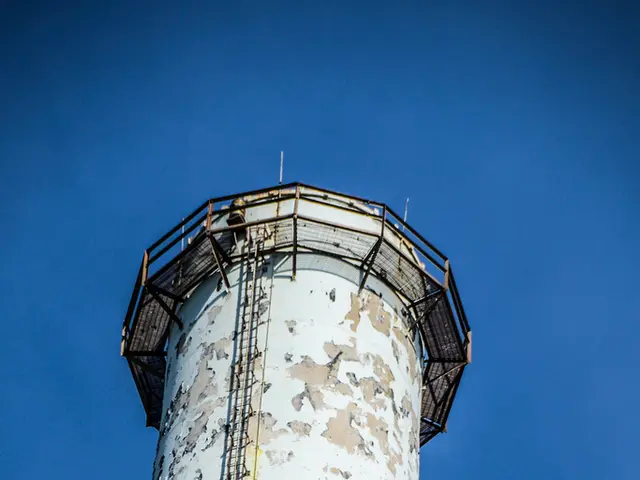Clash in Gaza: U.S.-Egypt diplomatic row over Rafah crossings poses challenge for Biden
The escalating tension between Egypt and Israel over the shuttered Rafah border crossing is causing a headache for the Biden administration, as their attempts to boost humanitarian aid to Gaza stagnate. For months, the US has been emphasizing the need to flood Gaza with aid. Although the amount was minuscule compared to pre-invasion levels, US officials and aid workers noticed a marginal improvement in aid deliveries.
The number of aid trucks entering Gaza nearly doubled from 2,545 in November to 5,671 in April, according to the UN. However, this still only accounted for 37% of the trucks entering before the conflict erupted in October, when 80% of Gaza's population relied on aid. The deterioration worsened with the closure of Rafah's border crossing.
This week, the World Food Programme expressed concerns that the "modest progress" made in enhancing aid deliveries could be at risk. The enclave is on the brink of famine, with the UN agency unable to access its Rafah warehouses due to the ongoing violence.
Rafah, a southern Gaza border town sheltering over a million Palestinians, is the main entry point for aid through its crossing with Egypt and the Strip's focal point. Israel seized the Palestinian side of the crossing earlier this month, sparking outrage from Egypt, which fears that the conflict could spill over into the volatile Sinai peninsula, causing a refugee crisis along the border.
In a call with Egyptian Foreign Minister Sameh Shoukry, US Secretary of State Antony Blinken reaffirmed the Biden administration's stand against any displacement of Palestinians from Gaza. Israel has suggested opening the crossing during its ongoing operations in other parts of Rafah, while retaining security control.
However, Egypt has made it clear that it will only acknowledge Palestinian control of Rafah, while the Palestinian Authority has ruled out managing the crossing under Israeli rule, according to Arabic media reports. The dispute poses a tricky predicament for the Biden administration, as it balances the urgent need to supply starving Palestinians with aid and Israel's stance on the future control of the crossing.
Dave Harden, a former USAID mission director in the West Bank and Gaza, says that Israel's actions at the Rafah crossing seem to set the stage for "long-term military occupation." Harden stated that the Biden administration would oppose such a move.
The Biden administration disagrees with Israel over a post-conflict roadmap for the enclave. Prime Minister Benjamin Netanyahu has rejected the possibility of the Palestinian Authority returning to govern Gaza and bristles at calls for proactive steps towards a two-state solution that could win support from neighboring Arab states.
Egypt is adamant in standing firm against Israel because it believes Israel has violated their 45-year-old peace treaty and subsequent agreements outlining the deployment of troops at the Rafah crossing. On Thursday, Egypt deployed additional armored personnel carriers and soldiers to its border with Gaza in northeastern Sinai.
Experts argue that Egypt views Israel's actions as a direct threat to its national security. If Egypt ceased cooperation with Israel, it could pose a problem for both the US and Israel, as Egypt could halt initiatives aimed at cracking down on remaining Hamas tunnels between Sinai and Gaza. David Witty, a former US Army Special Forces colonel, suggests that Egypt could simply carry out "token" tunnel checks as a form of retaliation against Israel.
- The escalating tension between Egypt and Israel over the Rafah border crossing, a major entry point for aid to Gaza, is causing concern for the Biden administration, as their efforts to boost humanitarian aid to the enclave are stagnating.
- The World Food Programme has expressed worries that the modest progress in enhancing aid deliveries to Gaza could be at risk, as the enclave is on the brink of famine.
- In an analysis of the ongoing crisis, Dave Harden, a former USAID mission director in the West Bank and Gaza, suggests that Israel's actions at the Rafah crossing seem to set the stage for "long-term military occupation."
- The Middle East is witnessing a political standoff between Egypt and Israel, with Egypt adamant in standing firm against Israel because it believes Israel has violated their peace treaty and subsequent agreements outlining the deployment of troops at the Rafah crossing.
- The media is abuzz with discussions about the dispute between Egypt and Israel over the future control of the Rafah crossing, a predicament that the Biden administration is grappling with as it balances the urgent need to supply starving Palestinians with aid and Israel's stance on the crossing.
- Experts in war-and-conflicts, like David Witty, a former US Army Special Forces colonel, argue that Egypt could carry out "token" tunnel checks as a form of retaliation against Israel, posing a potential problem for both the US and Israel, if Egypt ceased cooperation with Israel in cracking down on remaining Hamas tunnels between Sinai and Gaza.







